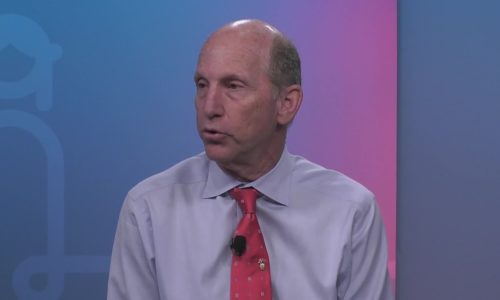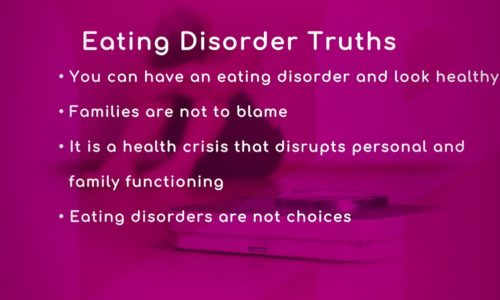Eating Disorders and Mental Health |
Dr. Molly McShane, Psychiatrist and Medical Director for Monte Nido and Affiliates, explains eating disorders are brain diseases that need treatment from psychiatrists, because these disorders interact with our environment. They are turned on or off, or get worse or better, depending on the environment the patient is in.
She also encourages anyone with suicidal thoughts to go to the emergency room, because they can stay safe and be treated in the immediate acute setting.
Transcript
To the general public the first thing that would come up would not be mental as it would not be the need for psychiatry because everything eating different it’s it’s more dietary substance it’s it’s has something else to do with it but there is a connection here could you make that connection for us please sure well the issue is these are brain diseases so brain diseases need treatment from psychiatrist people who work in the field of mental illness because these brain diseases interact with our environments so certainly for example eating disorder or substance abuse disorders are turned on or off or get worse or better depending on the environment someone’s in is it fair to say that that this is certainly everything is research and we’re growing and learning but there was a time and it might not have been too long ago when we would not have put psychiatry connected to these and we but we have simply learned because you use the word brain disease and there’s still that stigma that people don’t consider these diseases that’s right unfortunately there’s there’s a lot of mental health stigma still and we’re doing our best to get people into treatment where they need to be you know what happens a lot of times people feel it might be a moral failing or internalize or have a lot of shame or guilt and so they won’t seek treatment often until it becomes an emergency okay let’s let’s let’s get to emergency right now it’s good that you brought that up because we think of emergency rooms as those being able to handle just about everything and if there’s a problem we go to the ER with and not trying to disparage ER is in any way but is it fair to say that that with a lot of these ers they’re they’re not really handled or not really equipped to handle psychiatric emergencies well that that’s right you know if someone does have an emergency for example in our world of psychiatry would consider suicidality certainly an emergency a crisis that requires immediate assistance so I encourage anyone with suicidal thoughts to go to the emergency room because that’s a place where they can stay safe and be treated in the immediate acute setting but it’s not a place for people to seek ongoing treatment or address the underlying issues that dry the mental illness you
Dr. Molly McShane, Psychiatrist and Medical Director for Monte Nido and Affiliates, explains eating disorders are brain diseases that need treatment from psychiatrists, because these disorders interact with our environment. They are turned on or off, or get worse or better, depending on the environment the patient is in.
She also encourages anyone with suicidal thoughts to go to the emergency room, because they can stay safe and be treated in the immediate acute setting.
Transcript
To the general public the first thing that would come up would not be mental as it would not be the need for psychiatry because everything eating different it’s it’s more dietary substance it’s it’s has something else to do with it but there is a connection here could you make that connection for us please sure well the issue is these are brain diseases so brain diseases need treatment from psychiatrist people who work in the field of mental illness because these brain diseases interact with our environments so certainly for example eating disorder or substance abuse disorders are turned on or off or get worse or better depending on the environment someone’s in is it fair to say that that this is certainly everything is research and we’re growing and learning but there was a time and it might not have been too long ago when we would not have put psychiatry connected to these and we but we have simply learned because you use the word brain disease and there’s still that stigma that people don’t consider these diseases that’s right unfortunately there’s there’s a lot of mental health stigma still and we’re doing our best to get people into treatment where they need to be you know what happens a lot of times people feel it might be a moral failing or internalize or have a lot of shame or guilt and so they won’t seek treatment often until it becomes an emergency okay let’s let’s let’s get to emergency right now it’s good that you brought that up because we think of emergency rooms as those being able to handle just about everything and if there’s a problem we go to the ER with and not trying to disparage ER is in any way but is it fair to say that that with a lot of these ers they’re they’re not really handled or not really equipped to handle psychiatric emergencies well that that’s right you know if someone does have an emergency for example in our world of psychiatry would consider suicidality certainly an emergency a crisis that requires immediate assistance so I encourage anyone with suicidal thoughts to go to the emergency room because that’s a place where they can stay safe and be treated in the immediate acute setting but it’s not a place for people to seek ongoing treatment or address the underlying issues that dry the mental illness you
Dr. Molly McShane, Psychiatrist and Medical Director for Monte Nido and Affiliates, explains eating disorders are brain diseases that need treatment from psychiatrists, because these disorders interact with our environment. They are turned on or off, or get worse or better, depending on the environment the patient is in.
She also encourages anyone with suicidal thoughts to go to the emergency room, because they can stay safe and be treated in the immediate acute setting.
Transcript
To the general public the first thing that would come up would not be mental as it would not be the need for psychiatry because everything eating different it’s it’s more dietary substance it’s it’s has something else to do with it but there is a connection here could you make that connection for us please sure well the issue is these are brain diseases so brain diseases need treatment from psychiatrist people who work in the field of mental illness because these brain diseases interact with our environments so certainly for example eating disorder or substance abuse disorders are turned on or off or get worse or better depending on the environment someone’s in is it fair to say that that this is certainly everything is research and we’re growing and learning but there was a time and it might not have been too long ago when we would not have put psychiatry connected to these and we but we have simply learned because you use the word brain disease and there’s still that stigma that people don’t consider these diseases that’s right unfortunately there’s there’s a lot of mental health stigma still and we’re doing our best to get people into treatment where they need to be you know what happens a lot of times people feel it might be a moral failing or internalize or have a lot of shame or guilt and so they won’t seek treatment often until it becomes an emergency okay let’s let’s let’s get to emergency right now it’s good that you brought that up because we think of emergency rooms as those being able to handle just about everything and if there’s a problem we go to the ER with and not trying to disparage ER is in any way but is it fair to say that that with a lot of these ers they’re they’re not really handled or not really equipped to handle psychiatric emergencies well that that’s right you know if someone does have an emergency for example in our world of psychiatry would consider suicidality certainly an emergency a crisis that requires immediate assistance so I encourage anyone with suicidal thoughts to go to the emergency room because that’s a place where they can stay safe and be treated in the immediate acute setting but it’s not a place for people to seek ongoing treatment or address the underlying issues that dry the mental illness you
Dr. Molly McShane, Psychiatrist and Medical Director for Monte Nido and Affiliates, explains eating disorders are brain diseases that need treatment from psychiatrists, because these disorders interact with our environment. They are turned on or off, or get worse or better, depending on the environment the patient is in.
She also encourages anyone with suicidal thoughts to go to the emergency room, because they can stay safe and be treated in the immediate acute setting.
Transcript
To the general public the first thing that would come up would not be mental as it would not be the need for psychiatry because everything eating different it’s it’s more dietary substance it’s it’s has something else to do with it but there is a connection here could you make that connection for us please sure well the issue is these are brain diseases so brain diseases need treatment from psychiatrist people who work in the field of mental illness because these brain diseases interact with our environments so certainly for example eating disorder or substance abuse disorders are turned on or off or get worse or better depending on the environment someone’s in is it fair to say that that this is certainly everything is research and we’re growing and learning but there was a time and it might not have been too long ago when we would not have put psychiatry connected to these and we but we have simply learned because you use the word brain disease and there’s still that stigma that people don’t consider these diseases that’s right unfortunately there’s there’s a lot of mental health stigma still and we’re doing our best to get people into treatment where they need to be you know what happens a lot of times people feel it might be a moral failing or internalize or have a lot of shame or guilt and so they won’t seek treatment often until it becomes an emergency okay let’s let’s let’s get to emergency right now it’s good that you brought that up because we think of emergency rooms as those being able to handle just about everything and if there’s a problem we go to the ER with and not trying to disparage ER is in any way but is it fair to say that that with a lot of these ers they’re they’re not really handled or not really equipped to handle psychiatric emergencies well that that’s right you know if someone does have an emergency for example in our world of psychiatry would consider suicidality certainly an emergency a crisis that requires immediate assistance so I encourage anyone with suicidal thoughts to go to the emergency room because that’s a place where they can stay safe and be treated in the immediate acute setting but it’s not a place for people to seek ongoing treatment or address the underlying issues that dry the mental illness you








